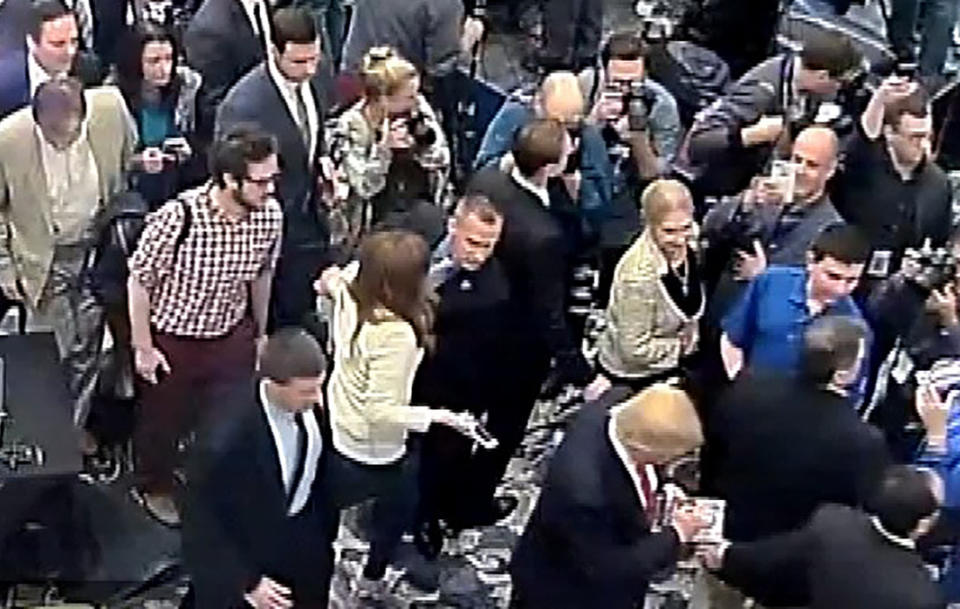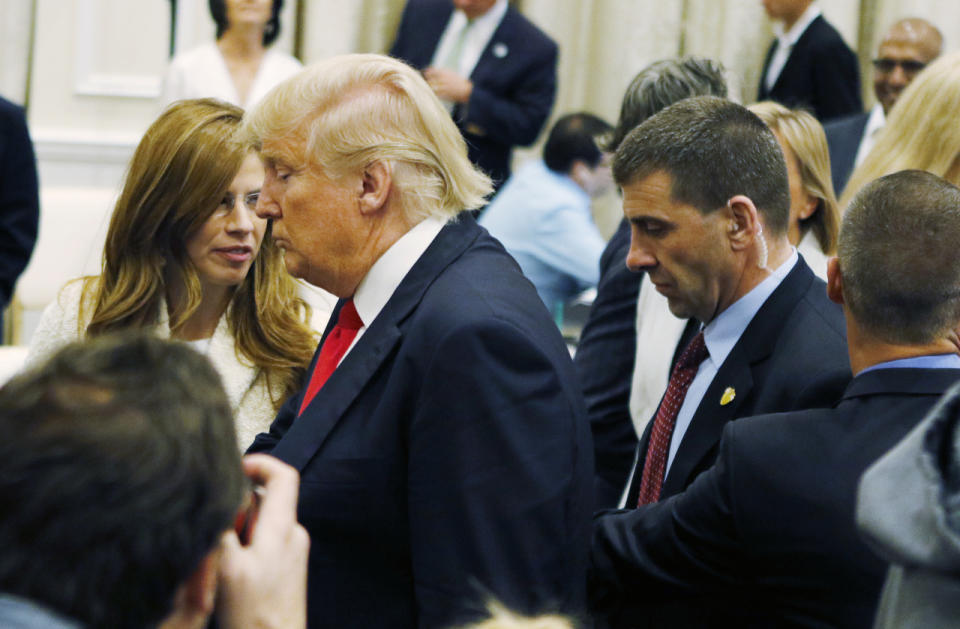Campaign manager’s battery charge shows why Donald Trump doesn’t need a normal PR strategy
Donald Trump’s latest explanation for the criminal charges filed against his campaign manager on Tuesday is, literally, explosive.
In a CNN town hall with the Republican presidential candidates on Tuesday evening, Trump claimed his campaign manager, Corey Lewandowski, may have grabbed a female reporter at a campaign event earlier this month because she could have been carrying a “little bomb.”
Earlier in the day, Lewandowski was charged with simple battery for grabbing the reporter, Michelle Fields, against her will at the event on March 8.
“She was grabbing me,” Trump said of Fields at the town hall, adding, “And just so you understand, she was off base because she went through the Secret Service, she had a pen in her hand, which Secret Service is not liking because they don’t know what it is, whether it’s a little bomb.”
Trump’s claim that Fields was “grabbing” him and may have looked armed is the latest in a series of shifting explanations he and his campaign have offered for the incident that included multiple lies. Initially, Trump and his team falsely denied Lewandowski ever touched Fields. They also claimed Lewandowski was not arrested on Tuesday, even though he was.
Yet a pair of public relations experts who spoke to Yahoo News on Tuesday both said they doubt the charges against Lewandowski and clear untruths the campaign has used to respond to them will hurt Trump.

Donald Trump’s campaign manager, Corey Lewandowski, center, is seen allegedly grabbing the arm of reporter Michelle Fields in this still frame from video taken March 8. (Image: Jupiter Police Department/Handout/Reuters)
Stu Loeser, a former spokesperson for Mayor Mike Bloomberg and Sen. Chuck Schumer, D-N.Y., who now runs a consulting firm that advises clients on media strategy and crisis communications, argued that the controversy would not hurt Trump with his base.
“It’s a truism of politics. … You can’t lose voters you never had,” Loeser said. “Many, if not most, of the people who are outraged or most outraged would never agree to vote for him.”
Howard Bragman, a crisis communications specialist who founded the Los Angeles public relations firm Fifteen Minutes, also said the incident would not hurt Trump with the supporters who propelled him to frontrunner status in the Republican primary.
“As Donald Trump himself has said, he could shoot somebody … and his supporters would still be his supporters. And I think that’s true. I think there could be a video of Donald Trump beheading someone, and I think his supporters would applaud him,” said Bragman. “So, if you’re a Donald Trump supporter, you’re going to think this reporter was aggressive and deserved whatever happened to her. If you don’t like Donald Trump, this merely reinforces the reasons that you don’t like Donald Trump, which are that he has some issues with the truth, that his positions are constantly in motion and evolving.”
The allegations against Lewandowski first surfaced on March 8, the night of the event at Trump’s golf club in Jupiter, Fla. Fields walked up to Trump to ask him a question while reporting for the decidedly Trump-friendly news site Breitbart. In a statement after the allegation first surfaced on Twitter, Breitbart CEO Larry Solov said Fields claimed someone “grabbed her arm” and that Washington Post reporter Ben Terris told her it was Lewandowski. Fields then published a piece in which she described being grabbed “tightly by the arm” and “yanked” down. She also shared a photo of bruises that she said were left on her arm by the incident. In a story for the Washington Post, Terris said Lewandowski “grabbed her arm and yanked her out of the way” and that this left Fields with “finger-shaped bruises.”

Lewandowski, right, reaches between Trump and a Secret Service agent (second from right) toward Breitbart reporter Fields, left, after a news conference held at Trump National Golf Club in Jupiter, Fla., March 8. (Photo: Joe Skipper/Reuters)
Trump and his campaign first responded by suggesting both reporters were lying. On Twitter, Lewandowski described Fields as “totally delusional.”
“I never touched you. As a matter of fact, I have never even met you,” Lewandowski wrote.
Trump campaign spokeswoman Hope Hicks claimed she had not seen anything. The candidate himself said Fields’ allegations were “in my opinion, made up.”
Loeser described these denials as a “calculated risk” by Trump and his campaign. Trump has built his lead in the Republican primary largely by arguing the political establishment has let people down. Because of this, Loeser posited Trump knows that his base will believe him over any press account or evidence presented by other sources.
“He is confident that, to people who are supporting him and might support him, he has more credibility in saying what’s true and what’s not true than most members of the media,” Loeser explained. “Donald Trump pretty quickly picked up the fact that, for a whole for a giant swath of Americans who have been lied to again, and again, and again, he has credibility as a truth teller in a way that … the official organs of our society — the media, press, television, elected officials — don’t.”
And Trump has stuck with this strategy even as the evidence against Lewandowski mounted.
After going public about the incident, Fields filed a police report. And on Tuesday, the Jupiter police charged Lewandowski with simple battery, a misdemeanor. The Trump campaign released a statement in response to the charges that said Lewandowski was “innocent” and had not been arrested.
“Mr. Lewandowski was issued a Notice to Appear and given a court date. He was not arrested. Mr. Lewandowski is absolutely innocent of this charge. He will enter a plea of not guilty and looks forward to his day in court. He is completely confident that he will be exonerated,” the statement said.
However, a spokesperson for the Jupiter Police Department told Yahoo News that Lewandowski was “given a notice to appear, which is the same as an arrest.” The police also released an “arrest report” for Lewandowski and video taken from a security camera at Trump’s golf course that clearly shows him coming into contact with Fields on the night in question.
In the arrest report, Jupiter officer Marc Bujnowski wrote that he interviewed Fields and saw the bruises on her arm. The officer also listened to audio Fields recorded as she attempted to question Trump that captured her and Terris describing the incident moments after it occurred. Bujnowski also gave a description of the surveillance footage.
“The video parallels what Fields had told me,” wrote Bujnowski, adding that Lewandowski “grabbed Fields’ left arm with his right hand causing her to turn and step back.”
After the emergence of the arrest report and the latest video footage, Trump and his team stopped trying to deny the incident occurred but continued to try to discredit Fields. In a series of tweets on Tuesday afternoon, Trump accused Fields of trying to “grab” him at the event before Lewandowski stepped in. Trump shared zoomed-in photos that showed Fields’ hand near his arm as she approached him and suggested perhaps he should be the one pressing charges.
“Why is this reporter touching me as I leave news conference? What is in her hand?” Trump asked.
On Tuesday evening during a televised town hall, Trump added the suggestion that Fields could have posed a “bomb” threat.

A police car sits outside the Jupiter Police Department on March 29. Lewandowski has been charged with simple battery after allegedly grabbing a reporter by the arm at a campaign event. (Photo: Mychal Watts/Getty Images)
Both Lewandowski and Fields did not respond to requests for comment on this story. An attorney for Lewandowski declined to comment beyond the initial statement released by the campaign in response to the charges.
Trump’s story about the incident has clearly changed after the emergence of the damning video and his campaign made the demonstrably false claim that Lewandowski was “not arrested.” Still, Loeser argued that the difference between denying outright the incident occurred and denying it took place as Fields, law enforcement, and reporters have described it is inconsequential.
“It’s not so far to travel between, ‘It didn’t happen,’ and ‘It didn’t happen the way that everyone who disagrees with you and doesn’t care about you says it did,” Loeser said.
Bragman, the public relations executive, echoed this notion and said the way people would react to the incident “depends on how you feel about Donald Trump.” While he said a more traditional candidate would be hurt if these charges were made against a top aide, Bragman suggested Trump is in a different category.
“I’ve always said one thing you have to learn in crisis PR is everyone has their own DNA with the media. Everyone gets a different response. … Two people can do the same thing and they’re not treated the same,” Bragman said. “It’s about expectations. It’s about audience, and he has a very different DNA than many of the other candidates.”
Bragman said Trump’s “DNA” is that he is “bulletproof” among his supporters. However, Bragman also argued that the criminal charges and the campaign’s changing responses could hurt Trump’s standing among undecided voters in the general election even if it doesn’t cost him with his primary base.
Trump said Tuesday he is standing by Lewandowski because he does not “discard” people who have been “treated unfairly.” Loeser described this as a “great line” that would help Trump capitalize on the distrust his supporters have for the establishment.
“It shows why people believe in him,” Loeser said of Trump’s remark. “People who think that they’ve been screwed … hear that differently than people who are fundamentally economically secure and living in New York, or Washington, or Chicago, or L.A.”
Loeser also suggested Trump could benefit from the fact that the alleged victim in this incident is a reporter.
“As someone who works in media and with media every day, we shouldn’t forget our tendency to overestimate the esteem in which most people hold reporters,” said Loeser. “Some of the people say, ‘Look at him hit that woman!’ But other people say, ‘Look at him fight with that reporter.’ The damage may not accrue in the same way.”
